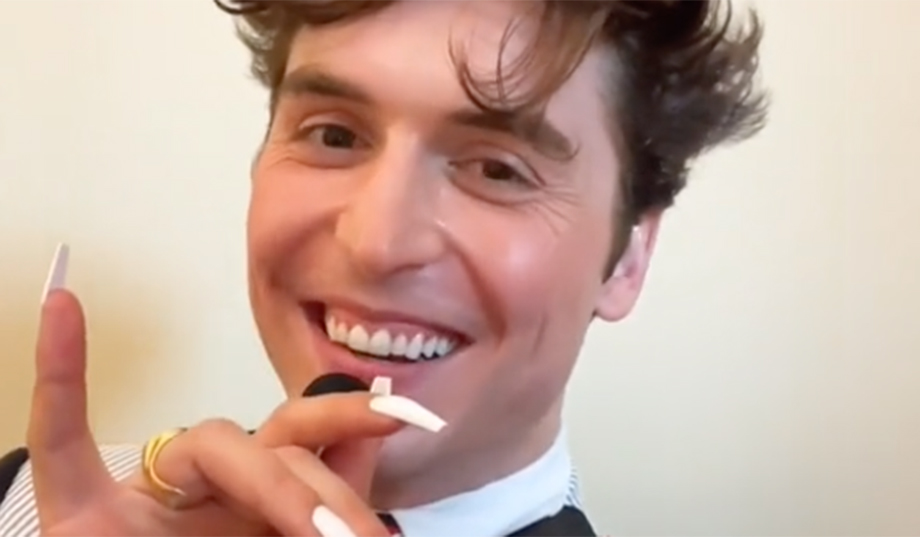
Earlier this month, the White House put out a TikTok video by comedian Benito Skinner (a.k.a. Benny Drama) that was intended to serve as a public-service announcement encouraging people to get vaccinated. In the video, a spoof of a White House intern’s day, the giddy Skinner bounces around the West Wing, exchanging wisecracks with White House press secretary Jen Psaki. The video raised eyebrows among conservative commentators such as Ben Shapiro and Todd Starnes, who wondered how the White House could have thought it effective and prudent to use the video as a vehicle for the vaccination message.
But it’s no surprise that a Democratic administration would use a pop-culture medium to advance a message — even when the pop culture of the moment is, as is so often the case, cringeworthy. The message to get vaccinated is, of course, worthy and important, and the government does have a compelling interest in curbing the spread of COVID-19. But to many people, the TikTok video seemed like a misguided effort.
Liberals have long employed pop culture — movies, TV, music, and so on — as a tool to influence public opinion, and politicians have gotten in on the act, trying to get a message out in a way that will reach audiences otherwise disengaged from politics. Those audiences are often the young, who are also the main consumer demographic in the entertainment industry. Pop culture is also often associated with trendiness; young people seeking social acceptance among their peers are likely to conform to the prevailing political ideas as expressed in the culture they consume. In doing so, they will absorb any message being pushed.
In 2014, for instance, then-president Barack Obama famously appeared on a popular YouTube comedy show, Between Two Ferns, hosted by Zach Galifianakis, to promote Obamacare. Hoping to encourage his audience to sign up for coverage on healthcare.gov, Obama specifically tailored his message to young people, which composed the bulk of the show’s viewership, urging them not to feel “invincible” and immune from health problems. According to the BBC, following Obama’s appearance on the talk show, the number of visitors to the government website rose sharply, by 40 percent.
Obama’s apparent success in weaving policy advocacy into lighthearted pop-culture entertainment stemmed from his accurate targeting of the audience and the appropriateness of his choice of medium: The viewers of Between Two Ferns were precisely the individuals he had hoped to reach — young and politically unaligned. Information posted on social-media accounts of the White House is likely to reach only those already sympathetic to the administration, and penning newspaper op-eds or appearing on political talk shows can only reach those who are more politically inclined (and in the case of Obamacare, people presumably already familiar with the provisions of the Affordable Care Act).
Democratic politicians also have long sought to benefit from celebrity endorsements during campaigns, mixing political messaging with pop-culture appeal. Obama ran a celebrity-draped campaign. Biden was endorsed, to name a few, by Beyoncé, Lady Gaga, Dwayne Johnson, and Tom Hanks. These pairings didn’t always quite work for old-school Biden. Recall that he once sat down for an uneasy Elle interview over Zoom with rapper Cardi B. One wonders what Biden hoped to gain from Cardi B’s fanbase of mostly teenagers.
That brings us back to Benny Drama’s White House romp. TikTok has taken the world of Gen Z by storm. Its short videos are curated by the application’s algorithm to cater to their specific interests. While anyone born before the 1990s may be perplexed by its allure, TikTok is quickly becoming one of the most influential platforms with the fastest-growing user base. As of 2020, the platform boasted 65.9 million monthly active users in the U.S. The Biden administration saw this latest invention of pop culture as an opportunity.
Unfortunately, its TikTok campaign for vaccination is unlikely to achieve its purpose. The medium is unserious and frivolous by nature, rendering it less well-suited to political messaging than Democrats hope. It’s hard to imagine Skinner’s exuberant skit eliciting anything other than a knowing laugh, and it’s harder still to believe that it would change anyone’s mind about getting the vaccine. In any case, and most importantly, it’s likely that the people following the White House’s and Benito Skinner’s social-media accounts were already enthusiastic about the vaccine and didn’t need convincing.
Did Biden’s policy advisers really expect the TikTok campaign to make a dent among those resistant to getting the COVID vaccine? Those with faith in the current administration’s competence may speculate that what they were really hoping for was to make the Biden administration seem cool and hip to secure liberal Gen Zers’ favor. In any case, while they may have won a popularity contest, the goal of increasing the vaccination rate among the young remains a challenge.

